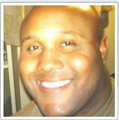Christopher Dorner's Navy Service Record And Mental Health Scrutinized

But it's unclear what Dorner's role with Navy Reserves has been since 2009, when he said he lost his security clearance. While reservists go through physical and mental health screenings upon returning from active duty, it remains a question whether Dorner had undergone any screenings since his tour of duty in Bahrain in 2007.
Phone calls made to the Navy Reserves were passed off several times, ending on the line with someone at the office of the Secretary of Defense, who wondered why he was being contacted. "If you have a question for the Navy, you ask the Navy, right?" he said.
The USC Naval ROTC office also didn't have answers. "Not today, man. Too fresh," the officer at the desk said.
READ MORE: Dorner Manhunt: Search For Ex-Cop Fugitive Enters Third Day As Trail Grows Cold
Dorner's violence started, as far as is known now, on Sunday, when he killed the daughter of an LAPD officer who had represented him in front of a police disciplinary board along with her fiancé, a USC campus police officer. A Navy commander has told the San Diego media that Dorner was honorably discharged from the Navy Reserves on Friday, though according to records he has not been active in the Reserves since January 2010.
During his service, he commanded a Navy Reserve Security team in Fallon, Nevada. Dorner wrote that he lost his commanding position after the Navy learned he had caused controversy in the LAPD when he told superior officers he'd seen another officer kick a schizophrenic person.
"If you lose your security clearance, you can't work in that field," said Bill Walsh, a former Navy captain who served as a psychiatrist in medical units. "I doubt he was functioning in any way in the Navy since 2009."
Nash said when someone on active duty is identified as having physical or mental issues, the Navy can't honorably discharge the individual until the issues are resolved or a disability plan is awarded. But with the reservists, the Navy can wave goodbye at any point.
Dorner's rampage stems from his outrage over being silenced and punished by the police department. He was relieved of his duties at the LAPD in 2008, had his commanding position at Fallon stripped in November 2009, and then spent a month serving in "various reserve units."
READ MORE: A Timeline Of Dorner's Alleged Crimes
Los Angeles Mayor Antonio Villaraigosa said at a press conference Thursday announcing proposed gun safety legislation that Dorner's "beef" with LAPD is no justification for violence.
"Whatever problem he has is mental," Villaraigosa said.
When reservists are recalled for training or deployment into war, Nash said they must pass physical examination. They fill out a health questionnaire and are checked out by a physician. Upon return from active duty, the process is nearly identical. Reservists returning from a war zone often have to fill out deployment-specific questionnaires in addition.
Asked whether service members answer honestly, Nash said, "Of course, they don't, especially someone who's a police officer or at risk of losing a security clearance."
The questionnaires aren't confidential, though Nash said recent studies comparing responses of active duty service members to confidential assessments has yielded a very different story when answers become privileged information.
If a service member doesn't admit to problems and no colleague reports that the individual might be having problem, a more exhaustive speciality evaluation isn't done.
Nash said there's been experimentation with the idea of evaluating everyone to determine whether it's really worth the effort.
READ MORE: Christopher Dorner: Who Is He?
According to a student at the University of Southern California who served active duty for the Navy overseas (who didn't want to be named), Dorner's training with the LAPD probably has more to do with his ability to shoot and kill than his time in the Navy Reserves, which he says calls for minimal duties. "Weekend warriors, they're called," he said.
The student also said that when he was discharged from active duty in 2005, the military didn't do any mental health evaluation on him at all. "They teach you how to dig a hole, they teach you how to shoot, but they don't tell you what to do after that," he said.
Read more of Neon Tommy's coverage of Christopher Dorner here.
Reach Senior Editors Paresh Dave and Michael Juliani here and here.



